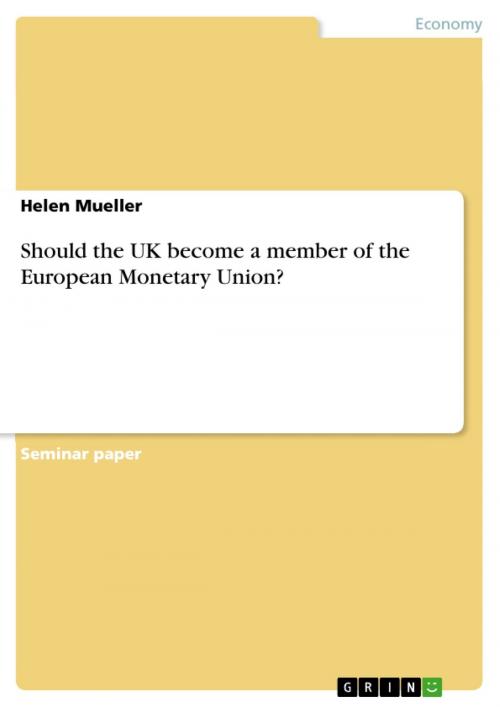| Author: | Helen Mueller | ISBN: | 9783638125888 |
| Publisher: | GRIN Publishing | Publication: | May 11, 2002 |
| Imprint: | GRIN Publishing | Language: | English |
| Author: | Helen Mueller |
| ISBN: | 9783638125888 |
| Publisher: | GRIN Publishing |
| Publication: | May 11, 2002 |
| Imprint: | GRIN Publishing |
| Language: | English |
Seminar paper from the year 2001 in the subject Business economics - Miscellaneous, grade: 1.7 (A-), Oxford Brookes University (School of Business), course: Business Environment UK, 19 entries in the bibliography, language: English, abstract: Background of EMU and current situation of the UK Since 1952 when the European Coal and Steel Community was founded the face of Europe has changed a lot. Barriers have been removed to enable goods, services, investment and people to move freely within the Community and politicians worked hard to get closer to the ideal of a political and economical united Europe. In two months the next major step will be taken by 12 nations of the European Union: The EURO will replace the old currencies. But Britain, although a member of the European Union, will not participate in Euro-zone in the foreseeable future. In 1991 the Maastricht Treaty (Treaty on European Union) was signed in order to extend the Treaty of Rome (1957). One part of this Treaty was the formation of an economic and monetary union (EMU). Therefore the European Central Bank (ECB) was established and a new currency - the ECU, today called Euro. The ECB shall replace the national central banks and its 'primary objective is to maintain a low and stable rate of price inflation for the euro currency.' 1) Although Britain had joined the exchange rate system (ERS), the so called 'parity grid' of the European Monetary System (EMS) in 1990 and had also signed the Maastricht Treaty it was forced to leave the EMS on Wednesday, 16 September 1992, known as 'Black Wednesday'. Sterling had dropped below the 'floor' of the grid and all measures to support the currency failed. The UK gained opt-outs from stage 3 of EMU during the Maastricht conference, which means: 'UK shall notify the council whether it intends to move to the third stage, and that unless it does, it will be under no obligation to do so.' 2) Now, as the EMU comes closer the subject presses hard on the Blair-government but a date for the planned referendum, which shall bring a decision, is still not stated. [...]
Seminar paper from the year 2001 in the subject Business economics - Miscellaneous, grade: 1.7 (A-), Oxford Brookes University (School of Business), course: Business Environment UK, 19 entries in the bibliography, language: English, abstract: Background of EMU and current situation of the UK Since 1952 when the European Coal and Steel Community was founded the face of Europe has changed a lot. Barriers have been removed to enable goods, services, investment and people to move freely within the Community and politicians worked hard to get closer to the ideal of a political and economical united Europe. In two months the next major step will be taken by 12 nations of the European Union: The EURO will replace the old currencies. But Britain, although a member of the European Union, will not participate in Euro-zone in the foreseeable future. In 1991 the Maastricht Treaty (Treaty on European Union) was signed in order to extend the Treaty of Rome (1957). One part of this Treaty was the formation of an economic and monetary union (EMU). Therefore the European Central Bank (ECB) was established and a new currency - the ECU, today called Euro. The ECB shall replace the national central banks and its 'primary objective is to maintain a low and stable rate of price inflation for the euro currency.' 1) Although Britain had joined the exchange rate system (ERS), the so called 'parity grid' of the European Monetary System (EMS) in 1990 and had also signed the Maastricht Treaty it was forced to leave the EMS on Wednesday, 16 September 1992, known as 'Black Wednesday'. Sterling had dropped below the 'floor' of the grid and all measures to support the currency failed. The UK gained opt-outs from stage 3 of EMU during the Maastricht conference, which means: 'UK shall notify the council whether it intends to move to the third stage, and that unless it does, it will be under no obligation to do so.' 2) Now, as the EMU comes closer the subject presses hard on the Blair-government but a date for the planned referendum, which shall bring a decision, is still not stated. [...]















